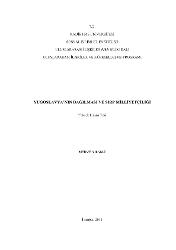| dc.description.abstract | Nationalism is a word, which is used to describe both a social movement and an ideology. It is a political thought which is reigning in Europe via 1789 French Revolution and in all over the world as of 20th century. The world political map was formatted according to the principles of nationalism in this period. Today, especially in underdeveloped societies, still it continues its existence as a common value.Historical circumstances by evolving during the thousands of years, has created a social economic order in that part of the world. As a result of this, that social organization, which is called nation, and its state has led to the emergence of this movement called nationalism.After the nationalism started to spread in Eastern Europe , nationalsim had shown the largest impact in the Balkans. Extreme level nationalism in the Balkans, had turned into a separatism and a carnage. Specially, the Serbian nationalism in Bosnia and Kosova had led to slaughters.Yugoslav nationalism, which is based on the South Slavs' language unity, conflicted with the Serbian nationalism, which is based on religious and common history unity. This issued had shown itself after the Tito's death in 1980. The established sensitive balance, in Communist Yugoslavia, between the different ethnic and religious elements was began to destroyed.1990's were difficult years for Yugoslavia. The understaing of nationalism of the Serbian people, had been quicking the collepse of Yugoslavia and led the country into a chaos. Although there are some intervening actions from international platform, via the consecutive independence news, Yugoslavia was buried in the dusty pages of history.This study demonstrates, how the nationalism can change a map of a country. From the axis of nationalism, especially by grounding on the Serbian nationalism, Yugoslavia's difficulties and challenges from establishment to collapse, are described. | en_US |
















